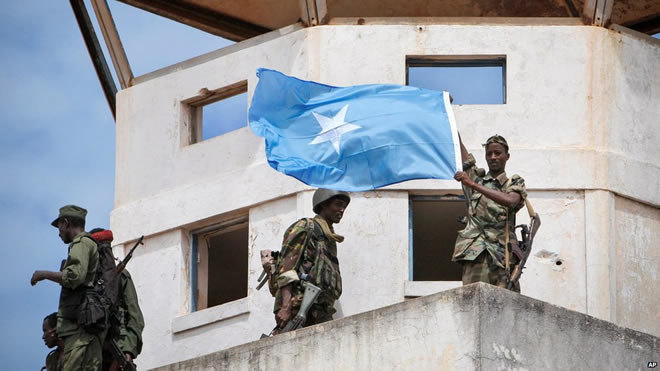

Wednesday, December 31, 2014
advertisements
Somalia, a troubled Horn of Africa nation that has not known peace since 1991, made significant military and economic headway in 2014.President Hassan Mohamud had promised that 2014 would see the end of Al-Shabaab, an Al-Qaeda-linked militant group that has been battling successive governments for years.
The announcement was met with considerable pessimism since the task fell squarely on an ill-trained national army and a poorly-funded African Union Mission in Somalia (AMISOM).
But January saw a major boost for AMISOM, when Ethiopia officially joined the peacekeeping force, swelling its ranks from 17,731 to more than 22,000.
The entry of Ethiopia marked the beginning of a military offensive aimed at eliminating Al-Shabaab.
The Somalia National Army and Ethiopian troops flushed the militants out of most of their strongholds in Somalia's upper-middle Shabelle region, with Al-Shabaab losing more than 12 towns between February and May.
Ethiopian and Djiboutian peacekeepers, with the help of local militants and the Somali army, later took control of most of the towns in the country's Hiraan and Jubaland regions.
The next target was the Lower Shabelle region, where the main base of the militant group was located.
In August, Somali and African troops launched a major offensive against the coastal town of Barawe, Al-Shabaab's main stronghold.
Ugandan and Somali troops, with the help of Kenyan air support, captured more than eight towns from the militant group.
Kenya carried out at least five airstrikes in 2014, which reportedly killed more than 350 militants.
By October 3, Barawe – a Swahili-Arab port city that had been the main source of revenue for Al-Shabaab – fell to allied forces.
The killing of Al-Shabaab leader Ahmed Godane in a U.S. drone attack in Lower Shabelle was the highlight of 2014.
Three top leaders of Al-Shabaab, including its intelligence chief Abdishakur, also known as Tahlil, were killed on December 29.
Tahlil had replaced Zakariya Hersi who was arrested a few days earlier from his hideout near El Wak.
But despite the blows, Al-Shabaab has continued to mount daring attacks.
In February, ten militants managed to break into the president's fortified residence in Mogadishu, killing five presidential guards. Nine of the attackers were killed.
Al-Shabaab also assassinated MPs Isaack Mohamed and Abdiaziz Mursal in April.
On May 24, Al-Shabaab militants attacked the parliament building in Mogadishu while lawmakers were in session.
All the attackers were killed after a five-hour gunfight, while several MPs suffered minor injuries.
The presidential residence came under attack again in July.
The year ended with an attack on Somalia's largest AMISOM military base.
On Christmas day, militants penetrated the Halane base camp and engaged African peacekeepers for more than seven hours.
Twelve people, including three peacekeepers and one civilian, were killed in the melee.
Al-Shabaab described the attack as revenge for the death of its leader, Godane.
Rising
As military operations have continued to make gains, things have also changed on the ground.
The year saw a significant number of Somalis in diaspora come back to the country following decades in exile.
This is expected to have a major impact on the growth of capital Mogadishu.
There has been a recent construction boom, with more buildings – commercial and residential – appearing on the Mogadishu skyline.
The country is now getting a complete makeover, replete with sandy beaches, football matches, new banks and ATM machines, classy restaurants and an increasingly vibrant nightlife.
The health sector will receive a major boost with the opening of the Turkish Hospital, which will be one of East Africa's largest medical facilities.
Turkey will continue to play a major role in the war-ravaged country's development, with plans to renovate the Aden Abdille International Airport and the Mogadishu port up to international standards.
The capture of the agriculture-based Shabelle region has also paved the way for banana cultivation – not only for local consumption, but for export as well.
Despite this year's military and economic gains, however, Somalia remains caught up in political wrangling, with Prime Minister Abdiweli Sheikh Ahmed recently falling out with President Mohamud.
A vote of no confidence in early December saw Ahmed replaced as premier by Omar Sharrmake, who had previously served as Somalia's ambassador to the U.S.